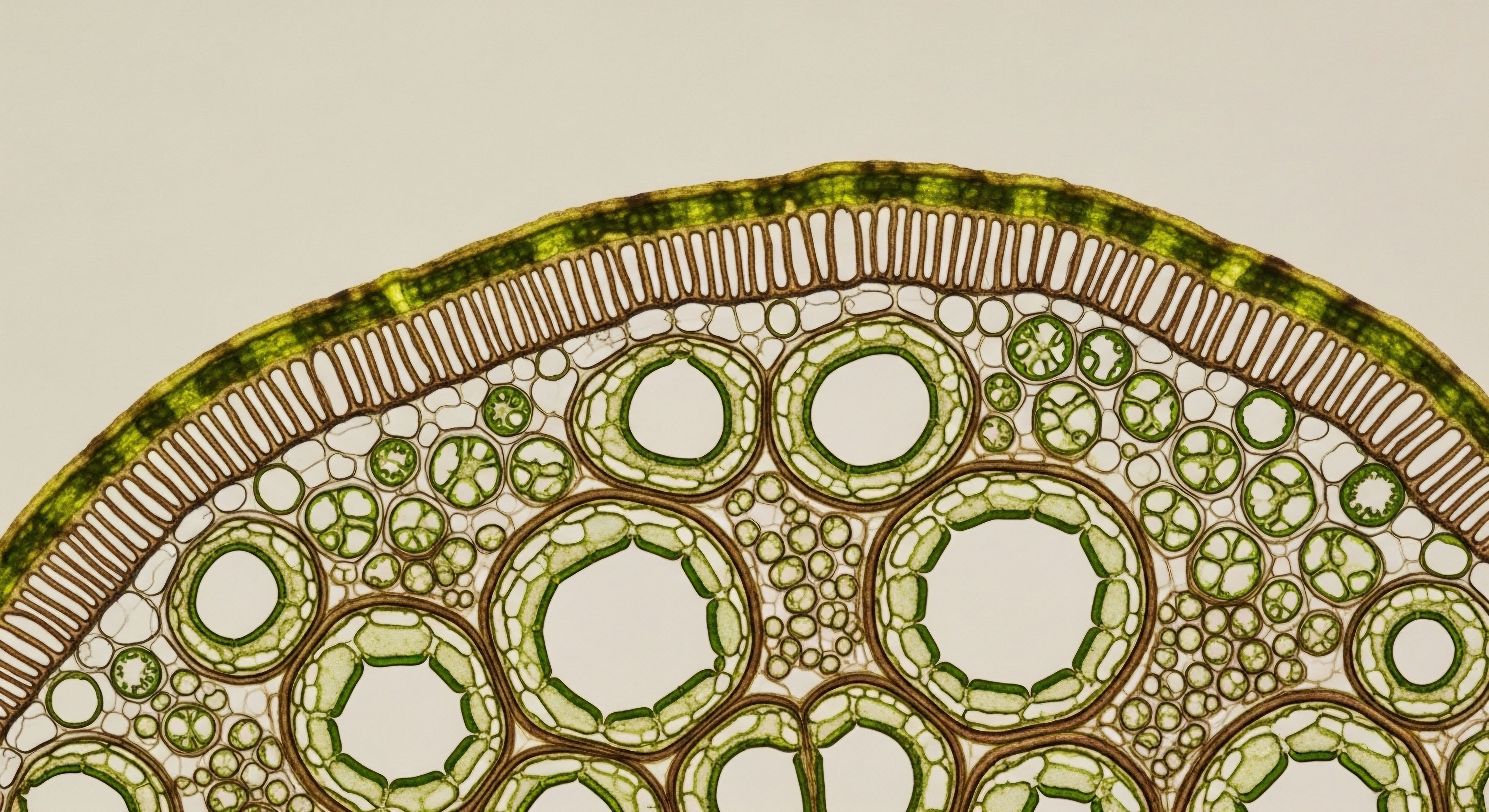

Fundamentals
Have you ever experienced moments where your body simply does not feel like your own? Perhaps a persistent fatigue, a lingering sense of unease, or a subtle shift in your physical capabilities that traditional explanations fail to address. Many individuals find themselves grappling with such sensations, often attributing them to the inevitable march of time or daily stressors.
Yet, these feelings frequently signal a deeper conversation occurring within your biological systems, particularly within the intricate network of your endocrine messengers. Your body communicates through a complex symphony of biochemical signals, and when these signals become discordant, the effects can ripple throughout your entire being, influencing everything from your energy levels to the very health of your cardiovascular system.
The cardiovascular system, a remarkable pump and delivery network, relies heavily on precise internal regulation. This regulation extends beyond simple mechanics, deeply involving the body’s chemical messengers. These messengers, known as hormones, are produced by various glands and travel through the bloodstream, carrying vital instructions to distant cells and organs.
When these hormonal communications falter, the heart and blood vessels can face significant challenges. For instance, imbalances in thyroid hormones can alter heart rate and contractility, while disruptions in adrenal gland function can affect blood pressure regulation. Understanding these connections represents a pivotal step in reclaiming your vitality and ensuring your cardiovascular system operates with optimal efficiency.
Peptides, short chains of amino acids, serve as another class of biological communicators, acting with remarkable specificity within the body. These molecules can influence a vast array of physiological processes, including those directly related to cardiovascular wellness.
Scientific inquiry increasingly highlights the capacity of certain peptides to modulate inflammation, support tissue repair, and even influence metabolic pathways that bear directly on heart health. Their precise actions offer a compelling avenue for complementing established health practices, providing targeted support where traditional methods might reach their limits.
The body’s internal communication network, particularly hormonal and peptide signaling, profoundly shapes cardiovascular well-being.

Understanding Hormonal Influence on Cardiovascular Health
The endocrine system, a collection of glands that produce and secrete hormones, functions as a master regulator of nearly every bodily process, including the delicate balance required for a healthy heart. Hormones direct cellular activities, influencing vascular tone, cardiac muscle function, and overall metabolic equilibrium. When these hormonal levels deviate from their optimal ranges, the cardiovascular system can experience significant strain.
- Thyroid Hormones ∞ Both an overactive and underactive thyroid can exert considerable strain on the heart. An excess of thyroid hormones can accelerate heart rate and increase the force of contractions, potentially leading to arrhythmias or even heart failure over time. Conversely, insufficient thyroid hormone levels can slow heart rate and reduce cardiac output, contributing to fatigue and other symptoms.
- Adrenal Hormones ∞ The adrenal glands produce stress hormones, such as cortisol and adrenaline. While essential for acute stress responses, chronic elevation of these hormones can lead to sustained increases in blood pressure and inflammation, both significant contributors to cardiovascular risk.
- Sex Hormones ∞ Testosterone and estrogen, often considered primarily for reproductive health, also play a substantial part in cardiovascular function. Imbalances in these hormones can affect lipid profiles, vascular elasticity, and inflammatory markers, influencing the long-term health of blood vessels and the heart muscle itself ,.
Recognizing the profound influence of these endocrine messengers allows for a more comprehensive understanding of cardiovascular wellness. It moves beyond a singular focus on cholesterol or blood pressure readings, expanding the perspective to include the intricate biochemical environment that shapes these metrics. This broader view empowers individuals to seek interventions that address root causes, rather than merely managing symptoms.

Peptides as Biological Messengers
Peptides, distinct from larger proteins, are short chains of amino acids that act as signaling molecules within the body. They possess a remarkable ability to interact with specific receptors, initiating precise biological responses. This targeted action makes them particularly compelling for therapeutic applications, as they can influence cellular processes with high specificity and often with fewer systemic side effects compared to broader pharmacological agents.
In the context of cardiovascular wellness, peptides offer diverse mechanisms of action. Some peptides can modulate inflammatory responses, a key driver of atherosclerosis and other heart conditions. Others may directly support the repair and regeneration of damaged tissues, including the heart muscle itself.
Certain peptides also influence metabolic pathways, such as glucose regulation and lipid metabolism, which are directly linked to cardiovascular disease risk. The emerging science of peptide therapies presents a promising frontier for supporting cardiovascular health by addressing underlying biological dysfunctions at a cellular level.


Intermediate
For those seeking to optimize their cardiovascular well-being, moving beyond a general understanding of hormones and peptides requires a closer examination of specific clinical protocols. This section explores how targeted therapeutic agents, including various peptides and hormonal optimization strategies, can complement traditional approaches to support heart and vascular health. We will consider the mechanisms by which these interventions operate, translating complex biochemical interactions into practical insights for enhancing systemic function.

Testosterone Optimization and Cardiovascular Considerations
Testosterone, a steroid hormone present in both men and women, plays a significant part in metabolic and cardiovascular health. For men experiencing symptoms of low testosterone, often termed hypogonadism, optimizing these levels can yield systemic benefits. Clinical data indicates that appropriate testosterone replacement therapy, when administered under medical guidance, can improve various cardiovascular risk factors.
Studies suggest that normalizing testosterone levels in hypogonadal men may correlate with a reduced incidence of major adverse cardiovascular events, including myocardial infarction and stroke. This benefit appears particularly relevant for men with existing cardiovascular disease or associated risk factors, such as diabetes or metabolic syndrome.
The mechanisms underlying these potential benefits include improvements in endothelial function, which refers to the health and flexibility of the inner lining of blood vessels, and enhanced vasodilation, the widening of blood vessels that improves blood flow.
Testosterone optimization can also influence lipid profiles, leading to reductions in total cholesterol and low-density lipoprotein cholesterol, alongside improvements in insulin sensitivity and inflammatory markers. While the overall cardiovascular safety profile of testosterone replacement therapy in men with hypogonadism appears reassuring, with no increased risk of major cardiovascular events in large trials, careful monitoring for potential side effects such as elevated hematocrit, pulmonary embolism, acute kidney injury, and atrial fibrillation remains essential.
For women, testosterone also contributes to overall vitality and metabolic regulation. While research on testosterone replacement therapy in women, particularly concerning cardiovascular outcomes, is less extensive than in men, initial findings suggest that physiological levels may be beneficial for cardiovascular health.
High-dose testosterone therapy in postmenopausal women has shown some adverse effects on lipid profiles, reducing both LDL and HDL cholesterol, underscoring the importance of precise, low-dose protocols when indicated. Hormonal optimization protocols for women often involve a balanced approach, considering progesterone and estrogen alongside testosterone to support comprehensive endocrine system recalibration.
Testosterone optimization can improve cardiovascular risk factors, but requires careful individual assessment and monitoring.

Growth Hormone Peptides and Cardiac Function
Growth hormone secretagogues (GHS), a class of peptides that stimulate the body’s natural production of growth hormone, are gaining recognition for their potential influence on cardiovascular health. These peptides, including agents like Sermorelin, Ipamorelin, CJC-1295, and Hexarelin, exert effects that extend beyond simple growth promotion. Research indicates that GHS can directly influence the heart and vasculature, independent of their growth hormone-releasing actions.
Specific GHS have demonstrated various cardioprotective effects. For instance, ghrelin and synthetic GHS have shown positive inotropic effects, meaning they can increase the force of heart muscle contraction, and promote vasodilation, improving blood flow. They also exhibit anti-apoptotic actions, protecting heart muscle cells from programmed cell death, and can promote cell proliferation, supporting tissue repair processes.
In models of heart failure, ghrelin administration has improved cardiac function, leading to increases in fractional shortening and ejection fraction, measures of the heart’s pumping efficiency. These peptides also possess antioxidative and anti-inflammatory properties, which contribute to overall cardiovascular resilience.
The table below outlines common growth hormone-releasing peptides and their general applications, with a focus on their relevance to systemic and cardiovascular health.
| Peptide Name | Primary Mechanism | General Applications | Cardiovascular Relevance |
|---|---|---|---|
| Sermorelin | Stimulates natural GH release from pituitary | Anti-aging, muscle gain, fat loss, sleep improvement | Indirect benefits via improved metabolism, body composition |
| Ipamorelin / CJC-1295 | Potent GH secretagogues, sustained GH release | Muscle growth, fat reduction, enhanced recovery, sleep quality | Potential for improved cardiac remodeling, metabolic health |
| Tesamorelin | GHRH analog, reduces visceral fat | HIV-associated lipodystrophy, fat loss | Direct reduction of visceral adiposity, a cardiovascular risk factor |
| Hexarelin | GHRP, strong GH release, direct cardiac effects | Muscle gain, recovery, potential cardioprotection | Shown to improve cardiac function post-myocardial infarction |
| MK-677 | Oral GH secretagogue, increases GH and IGF-1 | Muscle mass, bone density, sleep, skin health | Indirect benefits through systemic metabolic improvements |

Targeted Peptides for Specific Cardiovascular Support
Beyond growth hormone secretagogues, other peptides offer more specialized support for various aspects of wellness, some with direct or indirect implications for cardiovascular health. These agents represent a targeted approach to addressing specific physiological needs.
- PT-141 (Bremelanotide) ∞ Primarily recognized for its role in sexual health, PT-141 acts on melanocortin receptors in the central nervous system to enhance sexual desire and arousal. While not a direct cardiovascular therapy, sexual health is an integral component of overall well-being. It is important to note that PT-141 can cause a transient increase in blood pressure and is contraindicated in individuals with significant cardiovascular disease or uncontrolled hypertension. This underscores the necessity of a thorough medical evaluation before considering such therapies.
- Pentadeca Arginate (PDA) ∞ This synthetic peptide, derived from BPC-157, is gaining attention for its regenerative and anti-inflammatory properties. PDA is designed to support tissue repair, reduce inflammation, and promote recovery from various injuries and conditions. Its mechanism involves enhancing nitric oxide production, which improves blood flow through angiogenesis, the formation of new blood vessels. This improved circulation and reduction in inflammation can indirectly support cardiovascular health by fostering a healthier systemic environment. PDA’s potential for tissue healing extends to areas relevant to vascular integrity and overall systemic resilience.
The judicious application of these peptides, alongside comprehensive lifestyle modifications and conventional medical care, can represent a personalized strategy for enhancing cardiovascular wellness. The precise nature of peptide action allows for a highly tailored approach, addressing specific biological pathways that contribute to overall health and resilience.


Academic
To truly appreciate the potential of peptide therapies in complementing traditional cardiovascular approaches, a deep dive into the underlying endocrinology and systems biology is essential. The human body operates as an interconnected network, where the health of one system profoundly influences another.
Cardiovascular wellness, far from being an isolated domain, is inextricably linked to the intricate signaling of the endocrine system, metabolic pathways, and even the neurochemical landscape. This section explores these complex interdependencies, providing a sophisticated understanding of how targeted interventions can recalibrate biological systems for optimal heart health.

The Hypothalamic-Pituitary-Gonadal Axis and Cardiovascular Health
The Hypothalamic-Pituitary-Gonadal (HPG) axis represents a central regulatory pathway for sex hormone production, exerting far-reaching effects on systemic physiology, including cardiovascular function. The hypothalamus releases gonadotropin-releasing hormone (GnRH), which stimulates the pituitary gland to secrete luteinizing hormone (LH) and follicle-stimulating hormone (FSH).
These gonadotropins, in turn, act on the gonads (testes in men, ovaries in women) to produce testosterone and estrogen. Disruptions within this axis can lead to hormonal imbalances that directly influence cardiovascular risk factors.
In men, testosterone deficiency, often a consequence of HPG axis dysregulation, is associated with adverse metabolic profiles, including increased adiposity, insulin resistance, and dyslipidemia. These conditions are well-established contributors to atherosclerosis and cardiovascular disease progression. Restoring physiological testosterone levels through targeted replacement therapy can mitigate these risks by improving body composition, enhancing insulin sensitivity, and favorably modulating lipid parameters.
The impact extends to vascular function, with evidence suggesting improved endothelial health and reduced arterial stiffness following testosterone optimization. This systemic recalibration, mediated through the HPG axis, underscores the profound influence of sex hormones on cardiovascular integrity.
For women, the HPG axis undergoes significant changes throughout life, particularly during perimenopause and postmenopause, leading to fluctuating and eventually declining estrogen and progesterone levels. These hormonal shifts are associated with an increased risk of cardiovascular events.
While the direct causal link between sex hormone decline and cardiovascular disease is complex and still under investigation, hormonal optimization protocols aim to restore a more balanced endocrine environment. Low-dose testosterone, alongside appropriate estrogen and progesterone, can influence inflammatory markers and lipid profiles, potentially offering cardioprotection. The careful titration of these hormones, guided by comprehensive laboratory assessments, seeks to re-establish a biochemical equilibrium that supports cardiovascular resilience.
HPG axis balance is fundamental for metabolic and vascular health, directly influencing cardiovascular risk.

Growth Hormone Axis and Myocardial Remodeling
The Growth Hormone (GH) axis, comprising growth hormone-releasing hormone (GHRH), GH, and insulin-like growth factor-1 (IGF-1), plays a complex yet critical part in cardiac physiology and pathology. GH and IGF-1 are essential for normal cardiac development and function, supporting myocardial contractility and structural integrity. However, both deficiency and excess of these hormones can lead to maladaptive cardiac remodeling and increased cardiovascular morbidity.
Growth hormone deficiency in adults is linked to an increased prevalence of cardiovascular mortality, often due to heart failure. Patients with GHD frequently exhibit unfavorable lipid profiles, increased visceral adiposity, and impaired endothelial function. GH replacement therapy in these individuals has been shown to improve left ventricular mass and function, reduce diastolic blood pressure, and enhance exercise capacity, alongside beneficial changes in plasma lipid profiles. These observations highlight the therapeutic potential of modulating the GH axis to support cardiac health.
Peptides that act as growth hormone secretagogues (GHS), such as Sermorelin, Ipamorelin, and Hexarelin, offer a way to stimulate the body’s endogenous GH production. These peptides interact with specific receptors on pituitary cells, prompting a pulsatile release of GH that mimics the body’s natural rhythm.
Beyond their indirect effects via GH and IGF-1, some GHS, like Hexarelin, have demonstrated direct cardioprotective actions. Hexarelin has been shown to improve cardiac function following experimental myocardial infarction, suggesting a direct influence on myocardial cells and their recovery processes. This direct action, independent of systemic GH elevation, represents a compelling avenue for therapeutic intervention in cardiac injury and remodeling.
The table below provides a comparative overview of the physiological effects of GH deficiency and the observed benefits of GH replacement therapy on cardiovascular parameters.
| Cardiovascular Parameter | In Growth Hormone Deficiency (GHD) | With Growth Hormone Replacement Therapy |
|---|---|---|
| Left Ventricular Mass (LVM) | Reduced | Increased |
| Left Ventricular Function | Impaired | Improved |
| Diastolic Blood Pressure | Elevated | Reduced |
| Exercise Capacity | Decreased | Increased |
| Lipid Profile | Unfavorable (e.g. higher LDL) | Improved (e.g. favorable plasma lipid profile) |
| Cardiovascular Mortality | Increased prevalence | Potential reduction (long-term studies ongoing) |

Peptide-Mediated Anti-Inflammatory and Regenerative Pathways
Chronic, low-grade inflammation is a recognized driver of cardiovascular disease, contributing to endothelial dysfunction, plaque formation, and myocardial damage. Peptides offer a sophisticated means to modulate these inflammatory processes and promote tissue regeneration. Pentadeca Arginate (PDA), for example, represents a promising agent in this regard. As a derivative of BPC-157, PDA retains and potentially enhances its parent compound’s capacity to reduce inflammation and support tissue repair.
PDA’s mechanism of action involves increasing nitric oxide production, a molecule critical for vasodilation and healthy blood flow. This enhanced circulation facilitates nutrient and oxygen delivery to tissues, supporting their healing processes. Furthermore, PDA helps to calm inflammatory markers, such as TNF-α and IL-6, which are implicated in systemic inflammation and cardiovascular pathology.
Its ability to support the synthesis of extracellular matrix proteins aids in structural repair, particularly in connective tissues like tendons and ligaments, but also holds implications for vascular integrity.
The regenerative capabilities of peptides extend to direct cellular protection. Certain peptides can activate survival pathways within cardiomyocytes, shielding them from ischemic damage during events like myocardial infarction. This direct cellular influence, coupled with their anti-inflammatory actions, positions peptides as valuable complements to traditional cardiovascular interventions. They address the fundamental biological processes of repair and inflammation, offering a deeper level of systemic support that can enhance the efficacy of conventional treatments and contribute to long-term cardiovascular resilience.

References
- Stoekenbroek, R. M. et al. “Effect of LDL-cholesterol lowering on cardiovascular events across different baseline cardiovascular risk categories ∞ a meta-analysis of randomized trials.” European Heart Journal, 2015.
- Nauck, M. A. et al. “Once-weekly semaglutide in patients with type 2 diabetes.” New England Journal of Medicine, 2016.
- Doti, N. et al. “PS-5, a novel peptide inhibitor of JAK2/STAT pathway, prevents IFNγ-induced activation of STAT and its downstream inflammatory effects.” Journal of Biological Chemistry, 2012.
- Madonna, R. et al. “SOCS1-derived peptide PS-5 prevents myocardial ischemia/reperfusion injury by inhibiting JAK2/STAT1 signaling.” Cardiovascular Research, 2013.
- Sikirić, P. C. et al. “Pentadecapeptide BPC 157 and its effects on various organ systems.” Current Pharmaceutical Design, 2010.
- Vukojević, J. et al. “The effect of BPC 157 on neuronal damage post-stroke and behavioral disorders.” Brain Research Bulletin, 2018.
- Tudor, M. et al. “BPC 157 reduces damage and brain edema in traumatic brain injury.” Journal of Neurotrauma, 2019.
- Granata, R. et al. “Growth hormone-releasing hormone promotes survival of cardiomyocytes in vitro and protects rat hearts from ischemia-reperfusion injury.” Proceedings of the National Academy of Sciences, 2004.
- Ohlsson, C. et al. “Endogenous testosterone levels and the risk of major adverse cardiovascular events in elderly men.” Journal of the American College of Cardiology, 2011.
- Araujo, A. B. et al. “Endogenous testosterone and mortality in men ∞ a systematic review and meta-analysis.” Journal of Clinical Endocrinology & Metabolism, 2011.
- Traverse, J. H. et al. “Cardiovascular Safety of Testosterone-Replacement Therapy.” New England Journal of Medicine, 2023.
- Rochira, V. et al. “Testosterone replacement therapy and cardiovascular risk ∞ a review.” Translational Andrology and Urology, 2016.
- Wittert, G. A. et al. “Testosterone treatment and type 2 diabetes in men ∞ a randomized controlled trial.” The Lancet Diabetes & Endocrinology, 2014.
- Maraka, S. et al. “Sex Steroids and Cardiovascular Outcomes in Transgender Individuals ∞ A Systematic Review and Meta-Analysis.” Journal of Clinical Endocrinology & Metabolism, 2017.
- Zang, H. et al. “The impact of testosterone therapy on cardiovascular risk among postmenopausal women.” Journal of Women’s Health, 2018.

Reflection
As you consider the intricate biological systems that govern your vitality, a profound realization often surfaces ∞ your health journey is uniquely your own. The insights shared here, from the subtle whispers of peptides to the grand orchestration of your endocrine messengers, are not merely academic concepts.
They are invitations to introspection, prompting you to consider how your own biological systems might be communicating needs yet unmet. Understanding these complex interactions represents a significant step, a moment of clarity that can guide your choices.
This knowledge serves as a compass, pointing towards possibilities for recalibration and renewed function. It suggests that a truly personalized path to wellness involves listening intently to your body’s signals and seeking guidance that respects your individual biochemical blueprint. The journey towards reclaiming optimal health is a continuous dialogue, one where scientific understanding meets personal experience, leading to a more vibrant and functional existence.



